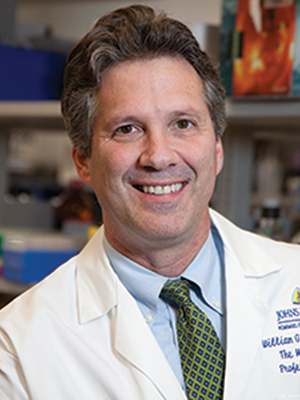
William G. Nelson, MD, PhD Photo by Joe Rubino
A PROGRESSIVE DECLINE in colorectal cancer mortality in the United States over the past decades has been a welcome public health success, mostly attributable to widespread screening for the disease among adults 50 and older.
For the past two to three decades, however, colorectal cancer cases and deaths have been increasing at an alarming rate among younger adults. Today, some 10% of all colorectal cancers arise before the age of 50, prompting the American Cancer Society, the American College of Gastroenterology and the U.S. Preventive Services Task Force to recommend colorectal cancer screening beginning at age 45.
What is behind this growing epidemic of early-onset colorectal cancer? Some cases may reflect an inherited predisposition for disease development. A significant family history of the disease can be identified in nearly 30% of patients diagnosed before age 50, with cancer susceptibility genes detectable via germline DNA sequencing in at least one in six early-onset colorectal cancer cases. For this reason, many physicians recommend that people with a family history of colorectal cancer begin receiving screening colonoscopies at age 40 or when an individual is 10 years younger than the age at which a first-degree relative was diagnosed with the disease. Genetic counseling and genetic testing can also be undertaken.
Aside from inherited risk, most epidemiology studies implicate the same modifiable risk factors for early-onset disease that are found in people diagnosed later in life—consumption of red and processed meats, refined grains, and processed sugar; ongoing smoking; and a high body mass index. Many of these risky behaviors can date back to adolescence. For example, both intake of sugar-sweetened beverages and obesity among teens have been associated with early-onset colorectal cancer.
Over the past few years, increasing attention has been focused on the microbial communities residing in the colon and rectum as possible mediators of cancer development. The great majority of the 10 trillion to 100 trillion microbes that constitute the human microbiome can be found in the colon. Organisms in the intestines aid in digesting foods, synthesizing vitamins, metabolizing drugs and regulating immunity, among other functions, and they are increasingly recognized as impacting health and disease. Dietary intake of fat, protein, sugar and fiber has a great influence on the composition of the microbiome in rodent studies. At least two of many bacterial strains found in the colon, Bacteroides fragilis and Fusobacterium nucleatum, may promote colorectal cancer development. Could changes in the gut microbiome from intake of red and processed meats, refined grains, and processed sugar dating back to the teen years be responsible for early-onset colorectal cancer?
In an article published in the January 2024 issue of Cancer Prevention Research, DNA sequencing technologies were used to inventory fecal microbiota compositions in 701 colorectal cancer patients and 693 control subjects. As expected, microbiomes tended to differ between those with colorectal cancer and those without. Yet there were also intriguing microbiome differences between early-onset and later-onset colorectal cancer cases. Increases in cancer-promoting bacteria were more common in people with early‑onset disease, and decreases in cancer‑preventing bacteria were more common in those with later-onset cancer.
To address the growing number of early-onset colorectal cancer cases, as well as to ensure a continued decline in later-onset disease, barriers to compliance with screening guidelines need to be overcome. Careful attention to family history must become a routine primary care practice so that screening recommendations can be tailored to individuals, including those under age 50, based on individual risk. In the future, colonoscopy and stool testing for colorectal cancer screening may be further augmented by circulating tumor DNA (ctDNA) tests, a new noninvasive tool that needs to be assessed in carefully conducted clinical trials.
Ultimately, the best approach may be to devise better tactics for promoting a healthier diet and lifestyle throughout life. The Greek philosopher Aristotle reportedly said that “good habits formed at youth make all the difference.” With regards to diet and lifestyle, good habits may indeed make all the difference in ensuring that a healthy gut microbiome can be established, reducing the risk of colorectal cancer at all ages.
Cancer Today magazine is free to cancer patients, survivors and caregivers who live in the U.S. Subscribe here to receive four issues per year.





